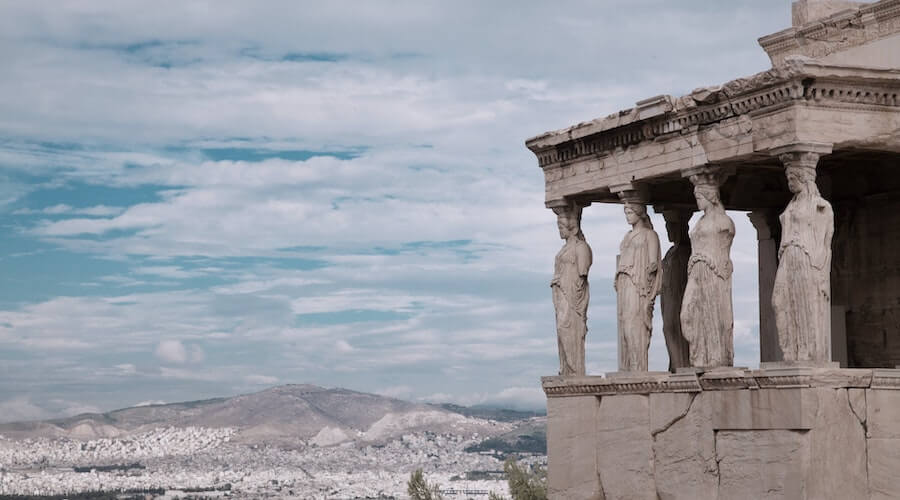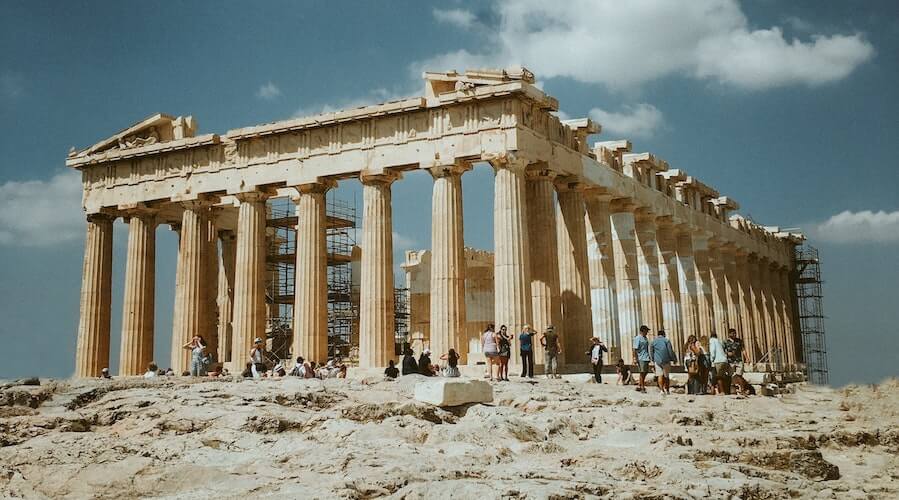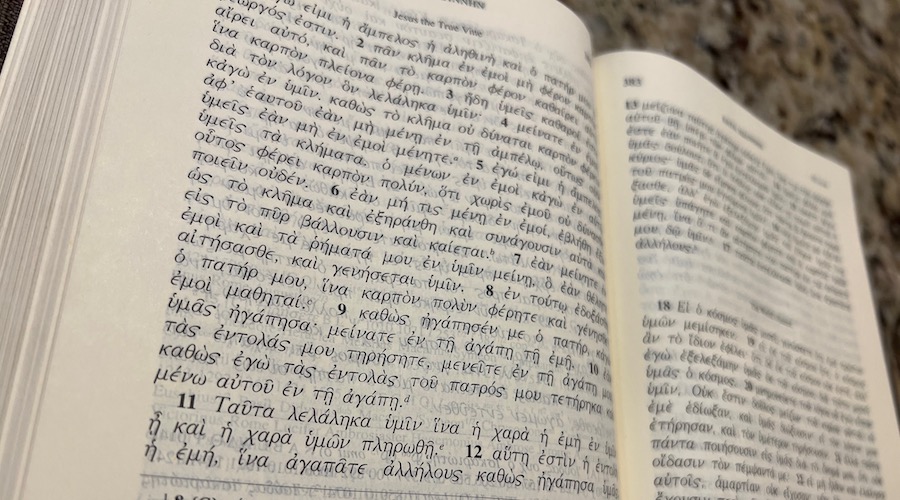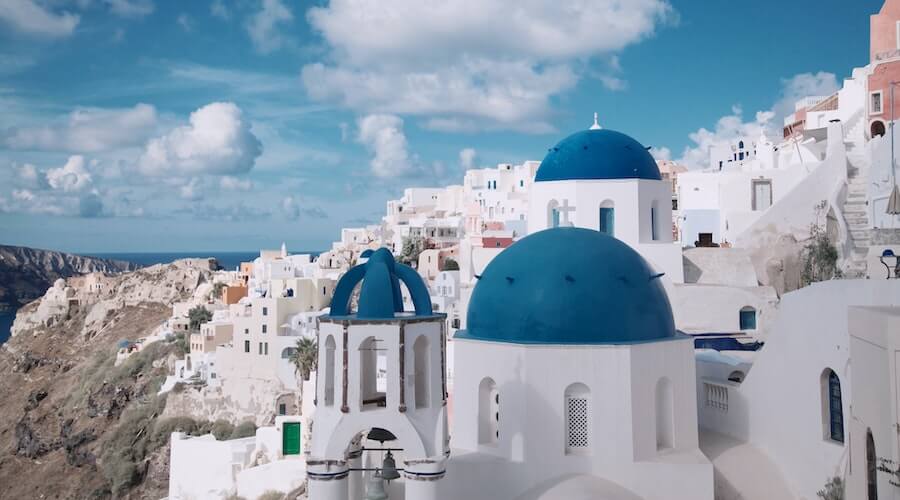Greece is a land renowned for white sand beaches and mythical lore. Any western student will recall names like Aphrodite, Ares, and Zeus, and the Percy Jackson series piqued mass interest in the Greek pantheon. Nowadays, Greece is a tourist hotspot, offering its signature blue-roofed homes and old temples. Its language gives a look into thousands of years that culminate in cultural and scientific influence across the globe.

Ancient Greek Temple
The Beginning Of A Centuries-Old History
The first settlers on the Greek islands arrived some 40,000 years ago. Thought to be simple hunters and gatherers, their earliest recorded writing dates back to the 14th and 13th centuries BCE. Greek is a part of the Indo-European language class, which also includes today’s Baltic-Slavic, German, and Roman vernaculars, among others.
In ancient times, the Greeks were referred to as Minaons, christened after King Minos. Their civilization was founded on the island Crete, but the Mycenaeans on the mainland are better known for Homer’s tales in The Iliad and The Odyssey.
The Mycenaeans had left behind palaces and other remnants of great wealth that stayed undiscovered until the year 1876. Before then, no one had been convinced that Homer was writing about a society that actually existed. Legendary characters, like Menelaus, Agamemnon, and Hercules, represented the true Mycenaean culture. They were battle-loving city states and often settled scores with one-on-one combat.
No Time to Learn Greek? Get a Translation Instead!
Let us help translate Greek to English or English to Greek.
Request Translations
Ancient Greek survived the Dark Age, a time when all writing was lost for approximately 300 years, and reemerged, building itself up to a golden epoch that spanned 480 BCE to Alexander the Great’s death in 323 BCE. This classical period saw powerful city-states rise and created what was the novel idea of democracy.
Remember the movie 300 with Gerard Butler? The legend of King Leonidas at Thermopylae encapsulates the bellicose nature of the city-state of Sparta. On the other hand, there was Athens, a bastion of glorious architecture and economic success. One famous Athenian project was the Parthenon, a temple dedicated to the goddess Athena that is still standing today.

The Parthenon Temple
Alexander the Great
Alexander the Great is most recognized for establishing the Hellenistic Empire, which ran from the Mediterranean to the northern point of India. Alexander, born in Macedonia in 356 BCE, united rebellious Greek cities and conquered territories in modern-day Turkey, Lebanon, Egypt, Iran, Punjab, and elsewhere.
Due to Alexander’s ambition, different cultures intertwined underneath the Hellenistic banner. It is ironic, then, that the emperor’s openness is what convinced his officers to attempt a failed mutiny. Speculation is that he died at the ripe age of 32 due to poisoning or disease. Alexander’s ambition was his downfall, but he is responsible for spreading Greek culture far beyond its indigenous borders.
A specific variation of Greek formed at this time: Koine Greek. Koine means “common,” and it was also referred to as the Alexandrian dialect. Although its use ceased by the time of Byzantine emperor Justinian, Koine’s influence was major. Many people today will recognize Koine as one language the Bible was translated into. Moreover, Koine was the foundation upon which modern Greek developed.

A Greek New Testament written in Koine Greek
Linguistic & Cultural Transformations
Throughout all this time, the Greek language was undergoing monumental change. Around the 8th century, the Greeks developed an alphabet similar to that of the Phoenicians. Dialects differed from one another depending on locality, and their development was divided by the Ancient, Hellenistic, Roman, Byzantine, and Modern phases.
The Hellenistic phase saw Greek language and culture expand until they reached the borders of India. The transformation that the Greek alphabet underwent within the Hellenistic age has been preserved up to today. It also is the model upon which the Latin alphabet is built.
The Roman phase recalls when the Roman Republic dominated the ancient world. A Roman governor was placed in charge of Greece, birthing conflict between the two territories, but peace prevailed at the beginning of the Roman Empire. Greek culture influenced Roman intellectuals and rulers alike, and Rome returned the favor by establishing a thriving trading partnership.
In the third century, threats from Germanic tribes in the West culminated in the sacking of Athens in 267 AD. Once a significant pillar of Greece, the city crumbled in relevance. However, another but less menacing force would be essential in altering the region forever: Christianity.
Saint Paul the Apostle was the main teacher of Christianity in Greece, cementing himself as a powerful historic figure. Saint Paul established the first Christian churches in Greece and modern-day Turkey. Some of his letters, known as Epistles, were written in Greek and thus shaped the beliefs of the Mediterranean region for years to come. And that influence is present today–98% of Greeks call themselves Orthodox Christians.
Check Out Our Other Language Profile Articles!
Afrikaans in South Africa—What Is Its History and Significance Today?
Is Chinese Really the Hardest Language in the World to Learn?
Arabic, the Language Of the Desert Revered By Close To Two Billion Muslims
The Alluring History Behind Swahili (And Why You Should Learn It)
8 Types of Spanish—How to Choose for Your Translations
Byzantine Empire & Turkish Conquest
Greek culture continued to resonate with the founding of the Byzantine Empire in 330 AD. It was a continuation of the eastern Roman Empire (after the West collapsed), where Christianity eventually became the state religion.
Koine Greek transformed during this time into the language Greeks speak today. The empire was also a backdrop for schisms within Christianity, seeing both the Roman Catholic Church and the Eastern Orthodox Church rival one another.
Emperor Justinian rooted out the last vestiges of pagan Greco-Roman traditions. He went further than the emperor Constantine in distinguishing Byzantine Christianity with Greek tradition, butting heads with the Catholic papacy.
Arts and architecture flourished during this time, but that would all come to a halt with the invasion of the Ottoman Turks in 1453. The period of Ottoman rule is known as Tourkokratia (Τουρκοκρατία), which is just Greek for “Turkish rule.” The following centuries were plagued with clashes between the colonizers and natives, but, in 1832, Greece was finally recognized by European powers as a sovereign state.
Turkish influence did not alter Greek culture much, and vice versa. However, their connected histories was apparent when the former Greek Orthodox church of Hagia Sophia became a mosque in June 2020.

The Hagia Sophia Grand Mosque in Istanbul, Turkey.
Resources To Start Learning Greek
Learning Greek, which native speakers call Ellinika (Ελληνικά), is hardly an impossible task. Here are a few book suggestions to get started:
- Aristarhos Matsukas’s Complete Greek: Teach Yourself Guide
- Eleni Maria Georgiu’s Eleni’s Greek Phrase Book: A Beginner’s Guide to Greek Culture and the Greek Language
- Georgios Papadakis’s Learn To Read Greek In 5 Days

While Greece has a fascinating history, it is an amazing place to visit in the current day.
Here are some basic phrases sure to be heard if you ever decide to explore the Greek islands one day:
- Kalimera (Καλημέρα) means “good morning”
- Kalinichta (Καληνύχτα) means “good night”
- Efharisto (Ευχαριστώ) means “thank you”
- Neh (Ναι) means “yes”
- O’hee (Όχι) means “no”
- Parakaló (Παρακαλώ) means “please”
In Conclusion …
The Greek language is a testament to the evolution of Western culture over thousands of years. Although no longer in its ancient form, modern Greek still captures that history very well. Additionally, proficiency in Greek is great for tourism and business alike.
There are plentiful resources to embark on gaining fluency, from grammar books to tsiftetelia (Τσιφτετέλια) music. Even just listening to melodic Greek conversation is a truly enjoyable experience. Καλή τύχη!
About the author: Althea Chokwe is a Masters student focusing on International Relations at Nottingham Trent University. She writes on a regular basis, interested in issues relating to society, global culture, the economy, and more. Althea also enjoys teaching herself languages and is aiming to become a polyglot. Connect with her on LinkedIn here.



